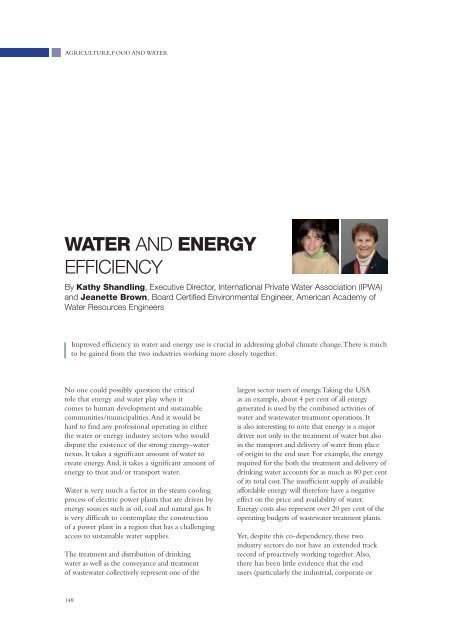Climate Action 2012-2013
You also want an ePaper? Increase the reach of your titles
YUMPU automatically turns print PDFs into web optimized ePapers that Google loves.
AGRICULTURE, FOOD AND WATER<br />
WATER AND ENERGY<br />
EFFICIENCY<br />
By Kathy Shandling, Executive Director, International Private Water Association (IPWA)<br />
and Jeanette Brown, Board Certified Environmental Engineer, American Academy of<br />
Water Resources Engineers<br />
Improved efficiency in water and energy use is crucial in addressing global climate change. There is much<br />
to be gained from the two industries working more closely together.<br />
No one could possibly question the critical<br />
role that energy and water play when it<br />
comes to human development and sustainable<br />
communities/municipalities. And it would be<br />
hard to find any professional operating in either<br />
the water or energy industry sectors who would<br />
dispute the existence of the strong energy-water<br />
nexus. It takes a significant amount of water to<br />
create energy. And, it takes a significant amount of<br />
energy to treat and/or transport water.<br />
Water is very much a factor in the steam cooling<br />
process of electric power plants that are driven by<br />
energy sources such as oil, coal and natural gas. It<br />
is very difficult to contemplate the construction<br />
of a power plant in a region that has a challenging<br />
access to sustainable water supplies.<br />
The treatment and distribution of drinking<br />
water as well as the conveyance and treatment<br />
of wastewater collectively represent one of the<br />
largest sector users of energy. Taking the USA<br />
as an example, about 4 per cent of all energy<br />
generated is used by the combined activities of<br />
water and wastewater treatment operations. It<br />
is also interesting to note that energy is a major<br />
driver not only in the treatment of water but also<br />
in the transport and delivery of water from place<br />
of origin to the end user. For example, the energy<br />
required for the both the treatment and delivery of<br />
drinking water accounts for as much as 80 per cent<br />
of its total cost. The insufficient supply of available<br />
affordable energy will therefore have a negative<br />
effect on the price and availability of water.<br />
Energy costs also represent over 20 per cent of the<br />
operating budgets of wastewater treatment plants.<br />
Yet, despite this co-dependency, these two<br />
industry sectors do not have an extended track<br />
record of proactively working together. Also,<br />
there has been little evidence that the end<br />
users (particularly the industrial, corporate or<br />
148












